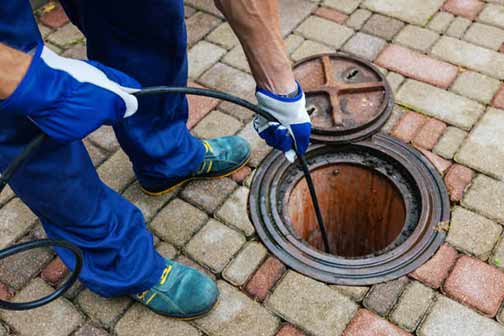
The main sewer line in your home is the large underground pipe that connects the drains in your home to the city sewer line in the street, explains Peabody Management. It is the main drainage channel for all used-up water from appliances and plumbing fixtures inside your home.
What would happen to your home if this critical plumbing fixture suddenly stops working?
Think about this for a moment!
Here is what would happen. If your main sewer line ever stops working, the wastewater generated from your home would have nowhere to go. Instead of flowing away into the municipal sewer lines in the street, it would build up inside your drain lines.
Imagine the impact of having sewage from the toilet build up inside your drain pipes. Would you be able to use your shower or kitchen sink if the dirty water refused to wash away? How would these problems impact your family’s health and comfort?
This thought experiment helps you understand the vital role played by your sewer line. Although it is buried in the ground and out of sight, problems in your sewer line can ripple upwards to impair your lifestyle and also pose a threat to your building.
This is why sewer line maintenance is critical for the comfort, health, and safety of the people who live in your home. It is also vital for maintaining the function of the various systems in your house and preserving the structural integrity of your home.
How do you maintain your sewer line, and what would be the direct benefits of doing this?
How to maintain your sewer line
To keep a sewer line flowing, there are things you should never do to the system and things you should do.
Do not flush non-flushable stuff
Even if labeled as flushable, the following items should never go into your toilet: paper towels, sanitary products, cat litter, diapers, latex condoms, etc. The only things you should put in the toilet are human waste, water, and toilet paper.
Do not pour fats, grease, and oil in the sink
Although they are soft and runny inside your warm kitchen, fats, oils, and grease (FOG) become a solid, sticky mass inside your sewer line. This material will stick to pipe walls and trap debris inside wastewater.
Do not dispose of food waste in the sink
Starchy foods (like rice, mashed potatoes, or potato peels), stringy veggies, coffee grounds, eggshells, etc., should not be washed into the drains. Before putting dishes or pans in the sink or dishwasher, scrape leftovers into the trash can.
Flush your drain lines monthly
There are lots of ways to do this using products that are already available in your kitchen. Baking soda and vinegar, boron, salt, hot water, and enzyme-based drain cleaners are safe for use as DIY drain cleaners in your home.
Inspect the sewer line periodically
At least once a year, a professional plumber will perform a sewer camera inspection. This in-depth inspection will let you detect problems in their early stages and deal with them promptly.
Clean your sewer line yearly
Hydro-jetting helps you get rid of the inevitable buildup that happens inside a sewer line. Doing this keeps you one step ahead by allowing you to prevent clogs and blockages. You may also use sewer rodding to clean your sewer line.

5 benefits of maintaining your sewer line
Prolong the life of your sewer line
Sewer lines are expected to last a certain number of decades. But there is no guarantee that a line will last as long as expected. Poor maintenance can increase the wear and tear on the line. But you can prevent this through proper maintenance.
Lower sewer maintenance costs
There are two ways good maintenance helps to cut the cost of maintaining your sewer line. It prevents problems that would have taken money out of your pocket. By prolonging the life of the sewer line, it saves you the cost of replacing it prematurely.
Protect your family’s health
A damaged sewer line can compromise your health by contaminating your drinking water. A clogged sewer line may also discharge sewage into your home if the problem causes the sewer line to back up. Good maintenance prevents these problems.
Improved indoor air
An oft-overlooked benefit of a functional sewer line is its impact on your home’s indoor air quality. A faulty sewer line will cause noxious sewer gases to enter your home, fouling the environment and threatening your health. It also encourages mold and mold gases.
Preserve the structural integrity of your building
Structural issues due to undetected sewer line leaks are a leading cause of foundation failure. A broken sewer line can secretly discharge water into the base of your home, undermining the foundation and causing sinkholes in the yard.
Lastly, a well-maintained sewer line means peace of mind; you avoid the stress of constantly putting out fires in your sewer line and never knowing when the next crisis will erupt. You and your family get the benefit of knowing that you are safe and secure from unexpected sewer line emergencies.

